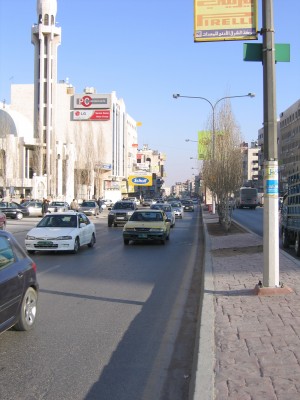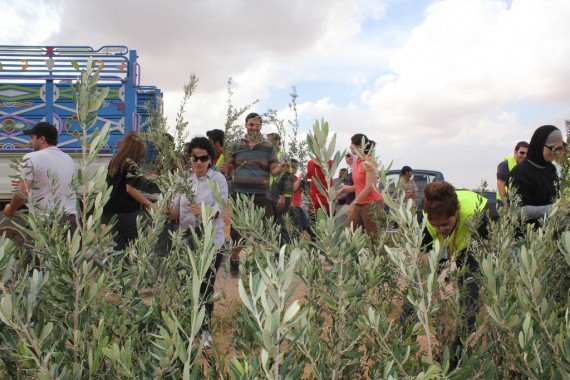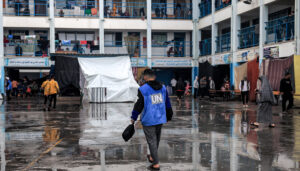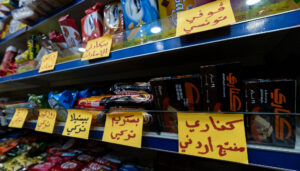Written by Lana Nasser
وطني … شغلت في البعد عنه … نازعتني نفسي إليه، فعدت، لأجده مزيناً…بالنفايات
لولا غيرتي عليك يا أردن، لما بحت بشيءٍ… ولكن حبي دفعني … فهاأنا أقول
My father tells me that in the late 60’s, he used to take my mother for driving lessons on “Gardens Street.” It was called Gardens Street because it was basically a field of trees. This was before my time. Driving down the street today, you’re lucky if you spot one patch of greenery. Today, the over-crowded street is lined with stone buildings and shops; a bustling commercial area with the typical frustrations of traffic violations. If you’re lucky enough to be walking on your feet, you’ll come across plastic bags, candy wrappers, and cigarette butts, replacing the fallen leaves of yesteryears. Thus said, it does still feel like a jungle out there, with animal sounds, cat whistles, and lion glares.

At some point in my lifetime, the name of the street was changed to “Wasfi al-Tal.” Three-time Prime Minister and national icon; the man was a hero to many Jordanians. It is said that he used to severely punish those who cut down trees. He must be turning in his grave. May he rest in peace.
In 2008 I had a couple of guests from Europe and the US visit me. I tried to show them my country the way I see it, the way I love it.
I took them to Bheida, where the spirit of the place and the sand, where the rocks have faces. Between the boulders I took them to a camp-out. The plan was to put candles in the crevices of the soft stone around us, but when we arrived, we found the area decorated already: plastic bottles, trash bags, cigarette packets and unidentifiable objects. Only the food scraps were gone, as the animals ate them. There were no bins in the area, but even if there were, would people have used them? My guests and I gathered much of the trash, and within half an hour, we filled up more than three large black-bags. After cleaning up, we did manage to light the candles.
That night, I couldn’t sleep, I felt ashamed of my people. Nonetheless, my guests still loved the country, they told their friends how beautiful their trip to Jordan was. “But it’s so sad” I heard one of them say, “people have no respect for nature and they are cruel to animals.”
In 2009, I took four guests from New York to a Bedouin camp in Bheida. Just before the first bird started singing, I woke up. At sunrise, I walked to the edge of the camp. I was greeted by bottles and plastic bags, cigarette packets and a piece of tin. I picked up the trash. Just before reaching the camp, I met with one of my friends. She too was carrying a bag. The Ammarin tending the camp were sad to see us returning as we did. They vowed they cleaned the area often, which they probably did. A few months later, I visited New York. The ladies whom I hosted invited me to dinner along with their families. We laughed about our adventures in Wadi Rum and the Dead Sea.
“Do you remember,” the host said as we ate, “how funny it was when we bumped into each other that morning with our trash bags!” I didn’t think it was funny; I wanted to stick my head in the oven.
Recently, I attended a workshop by The Public Action Project. Working with USAID, they are offering a grant of 4.5 million. They aim to raise awareness and facilitate positive change by supporting environmental initiatives. Their research is most extensive and reveals the deeper issues we face. The most interesting to me, was their study about citizens’ behavior, and in particular concerning littering.
Why do people litter? What do they not care about their land, and why do they go out of their way to harm it?
The findings: No accountability or feeling of ownership. No fear of penalty. No enforcement of littering laws. Some said there weren’t enough trash bins, some blamed the Municipality and street cleaners, while others blamed the neighbors. They blamed government corruption, wasta and not putting the right people in the right place. The research revealed the animosity that people have towards the state, their resentment and apathy. They do not trust the state, nor do they believe it has their best interest in mind. In fact, they think it does not care about them at all-unless they have the right family name. By littering, they are somehow punishing their government.
This isn’t such a crazy thought, some serious vandalism happens in revenge. In Jarash recently, for example, while firemen were putting out a fire in the woods, some good samaritans were setting more trees aflame. Perhaps, it is their way of playing cat and mouse.
Rumor has it that the Ministry of Environment plans to start enforcing environmental laws. But why would it, when hardly anyone else does. It’s like expecting the traffic police to ticket double and triple parking; or expecting the Awqaf to enforce the mandate on prohibiting the airing of Friday sermon on the loud speaker.
I am cynical, I wish I were not! I want to believe that people can change without being forced to. I want to believe that people can actually learn to love nature, “in spite of the State.”
So what do we do? Do we create a green movement, but present it as a ‘counter movement’, while covertly working with the government to create change? Would people buy it and start working for the environment just to spite the government? Would it work? Do the actions of the government, like cutting down hundreds of olive trees to make a high way, for example, convince the masses that the government is anti-environment, and would environmentalism then become a revolutionary act?
I like to be an optimist, but the situation is grave. It is more than just an issue of “environment.” The real danger is in the underlying cause to this disease that makes people capable of destroying their own country and its resources.
Changing Government Changing People
For Jordan to develop, there needs to be reform. It’s not just about a new parliament, or a Ministerial game of musical chairs, it’s about a change in the paradigm itself. There is a lengthy history of corruption, and an overhaul is needed. Choosing the people who actually know about the area they are governing; people with vision and those who love the country more than their bank accounts and prestige. But even if this is done on the Ministerial level, what about parliament?
Elections are coming up and many people won’t vote. They don’t think it will make a difference. Are they right to believe that their voice doesn’t matter? How can their trust be regained? How can they re-develop loyalty? And if they do go out to vote, are they educated enough to actually ‘choose’ what serves their person and their country, rather than just choosing a member of their clan or who the sheikh told them to vote for. And even if they did vote consciously, could there ever be a fair election?
To many, the answer is negative, so they shun the system and make-believe it’s not there? But might this apathy and disengagement be perpetuating the problem?
You. We. Living on the fringe, philosophizing everything and being artists, acting civilized but disengaging, speaking عربيزي and hence reading this article: our survival and liberties depend on our active participation. Voting is not a right, it is a duty! It’s your duty, and mine. And while I’m at it, I’ll be looking for a candidate who at least mentions the environment, amongst other things.










